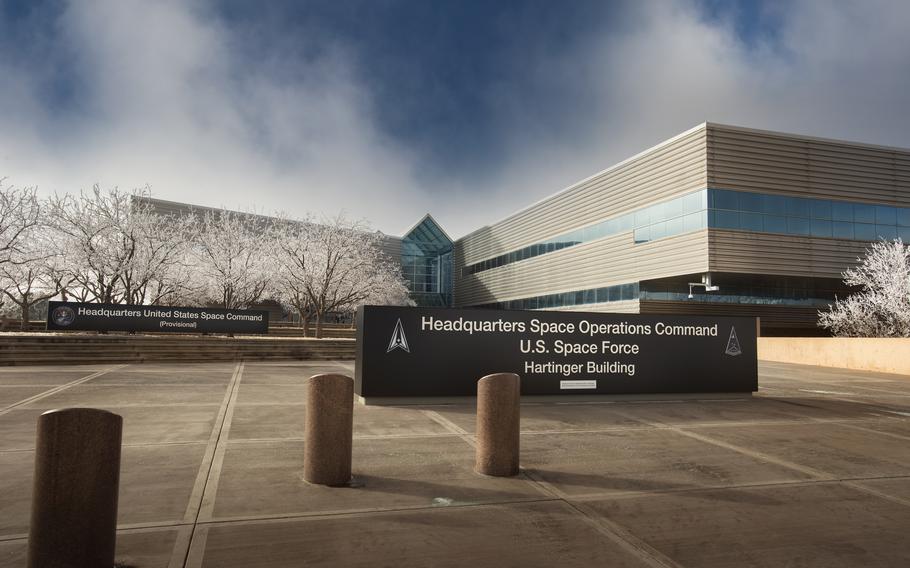
Building 1 at Peterson Space Force Base, Colo., shown in 2022, is the provisional headquarters of U.S. Space Command. (U.S. Space Command)
WASHINGTON — New military construction would be needed to support a permanent U.S. Space Command headquarters in Colorado, a government watchdog found as lawmakers continue to argue over the final location of the combatant command.
A new report by the Government Accountability Office states the command’s posture in Colorado Springs, where it operates out of four separate buildings, is “not sustainable long-term” due to struggles with staffing, communications and space restrictions.
The report also outlines how the Air Force decided on Redstone Arsenal in Huntsville, Ala., as the cheaper and preferred location for Space Command’s permanent headquarters before President Joe Biden announced in 2023 that the command would stay in Colorado.
Rep. Mike Rogers of Alabama, the Republican chairman of the House Armed Services Committee, requested the GAO review and said it validated President Donald Trump’s decision during his first term to base the command’s headquarters in Alabama.
“President Biden cited ‘military readiness’ to justify his choice, but we now know his own administration officials repeatedly told him that Huntsville was the best location, and ‘military readiness’ concerns were fictional,” Rogers said in a statement.
The report highlights several challenges with keeping Space Command headquartered at Peterson Space Force Base in Colorado Springs, where the command has been temporarily based since its inception in 2019.
Though Space Command declared itself operationally ready nearly two years ahead of schedule in December 2023, it continues to fall short of its civilian staffing and workspace needs in its provisional headquarters.
As of October 2024, the command had filled 1,024 of 1,379 authorized positions and hired about 380 contractor personnel to bridge gaps in civilian hires, which are intended to comprise 60% of staff. The struggle to hire partly stems from the uncertainty of the command’s final location, the report states.
The command’s workforce is spread across four buildings in the Colorado Springs area — two are located on military installations while the other two are in commercial and residential areas. The footprint is cumbersome and cramped, requires travel and hurts collaboration, according to the report.
“Officials told us that as a result of such challenges, the command requires military construction of a permanent, purpose-built facility that is better suited to meet its unique power, information technology, square footage, and security needs,” the GAO wrote.
The report noted officials saw several benefits of remaining in Colorado Springs, a hub of other space missions and centers, despite the hurdles. The area is also home to U.S. Northern Command and North American Aerospace Defense Command.
“According to U.S. Space Command officials, the ability to leverage existing operational networks provides U.S. Space Command with critical redundancy that would take considerable resources to recreate in other candidate locations,” the GAO stated.
Colorado lawmakers are continuing to lobby to keep the command in their state.
Rep. Jeff Crank, R-Colo., said the report made clear that ongoing efforts to move the command’s headquarters “only hurts our national security.”
“Space Command is fully operational, and the Department of Defense needs to move quickly to construct a permanent HQ at Peterson Space Force Base to put the issue to bed, once and for all,” Crank said Thursday on X.
In April, a report by the Defense Department Office of Inspector General revealed concerns that 1,000 civilian employees would not relocate from Colorado to Alabama if the headquarters were to be moved to Redstone Arsenal.
The GAO this week added more uncertainty to a potential move by casting doubt on the reported savings that could come from it.
The Air Force has said relocating to Huntsville would cost $426 million less than staying in Colorado Springs across a 15-year period but the GAO said the cost estimates “were incomplete and did not fully compare alternatives’ costs across the command’s entire life cycle.”
“Without complete and reliable cost estimates, it can be hard to discern the comparative benefits associated with each candidate locations,” the GAO report said.
A decision on a final basing location is expected to come soon.
Rep. Robert Aderholt, R-Ala., told a local news station in Alabama on Thursday that Trump will need to settle the issue in the coming weeks in order to move forward with his plans for the Golden Dome missile defense shield.
Space Command, which is responsible for military operations in outer space, is likely to play a key role in the development of the system.